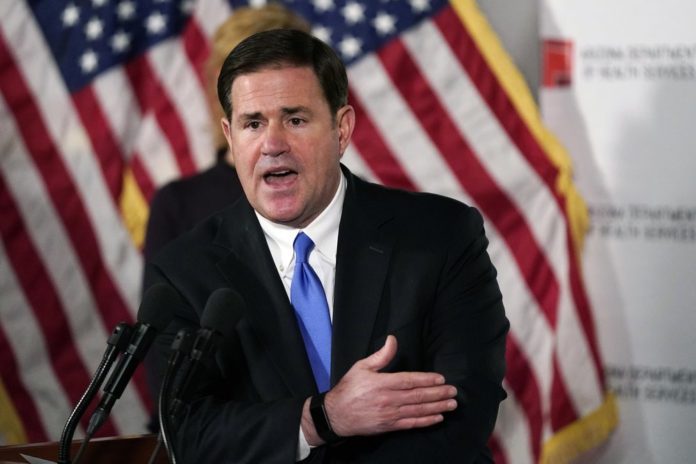Arizona Gov. Doug Ducey signed nearly two dozen bills Friday and vetoed one as he works to clear his desk of the measures lawmakers sent him toward the end of the legislative session that wrapped up last week.
Ducey signed bills banning state or local governments from requiring training in “critical race theory” and shielding small business owners from paying any of the 3.5% income tax surcharge voters approved in November.
The one bill he vetoed would have required the governor to convene an emergency council at least once every 14 days after proclaiming a statewide state of emergency, such as the one still in effect for the COVID-19 pandemic. The measure “would add unneeded bureaucracy to the management of emergencies, especially wildfires,” Ducey wrote in a letter explaining his veto.
The Republican governor faces a Monday deadline to sign or veto the 11 bills remaining. In addition to the critical race theory and taxation legislation, Ducey enacted:
— New penalties for drivers caught street racing, which law-enforcement officials say is a growing problem. Drivers will face stiffer misdemeanor charges and an additional $1,000 fine that will help pay for anti-racing efforts. Officers will be able to immediately impound vehicles used in street races for seven days. The latter provision has drawn opposition from critics who say the government shouldn’t be able to take someone’s vehicle before they’ve been convicted in court.
— Power for people to ask a judge to seal court records of old arrests and convictions. Supporters say the new procedures will make it easier for people to get housing and a job without past legal troubles standing in their way. Old records will be eligible for sealing anywhere from two to 10 years after all fines are paid, and other sentencing conditions are met, depending on the severity of the crime. Prosecutors and victims will get a chance to object.
— Limits on the factors that hospitals can consider when rationing care during a future pandemic or other emergencies that overwhelm health care providers. Policies for “crisis standards of care,” which specify how to allocate supplies or staff when there aren’t enough to go around, will be limited to considering a patient’s short-term survival prospects. Doctors won’t be able to consider the person’s quality of life or life expectancy — a priority for advocates of people with disabilities.
Republished with the permission of the Associated Press.














